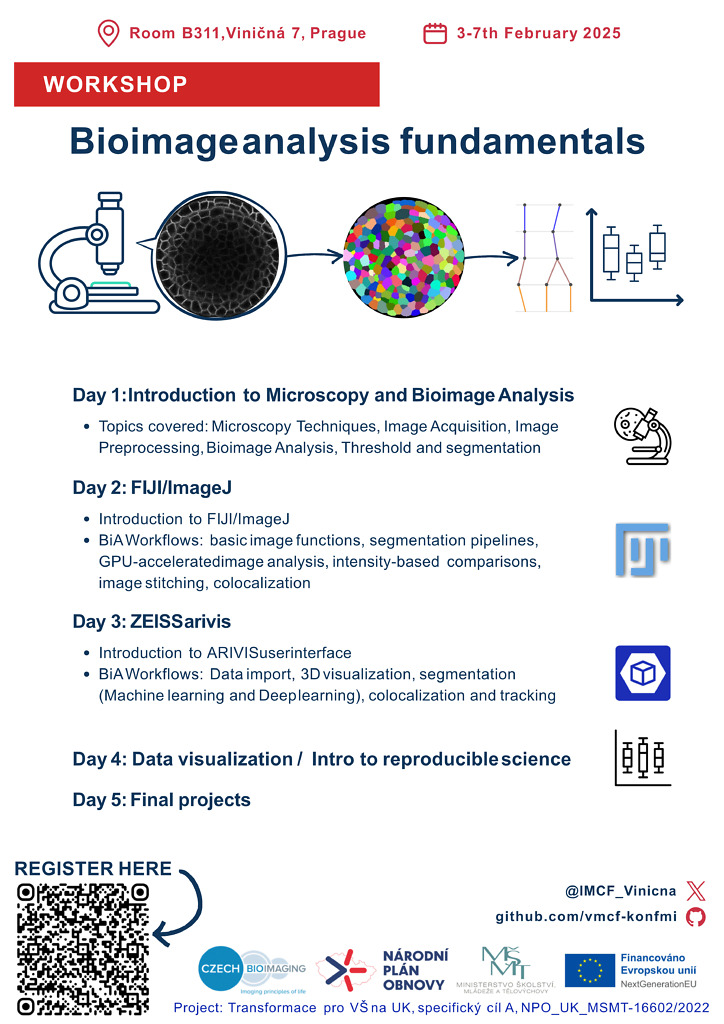BioImage Analysis Fundamentals – 2025
This 5-day workshop is intended to give a thorough introduction to Bioimage analysis for individuals with little to no prior experience but who want to develop some basic skills in image processing and analysis workflows using both open-source and proprietary software. Participants will get hands-on experience with image restoration, segmentation techniques, feature extraction and tracking using classical and advanced machine and deep learning tools. Most importantly, students will gain insight in data visualization and analysis for reproducible research. By the end of the workshop, attendees will have the opportunity to work on a final project, in which they will be able to apply the newly learned skills on a real-world bioimage analysis challenge.

Workshop Objectives:
By the end of this workshop, participants will be able to:
- Understand foundational microscopy techniques and the principles of bioimage acquisition and analysis.
- Apply essential image processing methods, such as thresholding and segmentation, to analyze bioimages effectively.
- Use FIJI/ImageJ for performing detailed image analysis, including stitching, colocalization, and intensity-based comparisons.
- Leverage ZEISS arivis for advanced 3D visualization, machine learning-based segmentation, and tracking.
- Create reproducible data visualizations and establish workflows for consistent bioimage data management.
- Engage in hands-on sessions designed to tackle real-world bioimage analysis challenges.
- Connect and collaborate with peers, fostering professional networking and knowledge exchange.
Workshop Agenda:
Day 1: Introduction to Microscopy and Bioimage Analysis
Topics Covered:
- 9:00 – 9:15 – Workshop Introduction and Overview
- 9:15 – 10:00 – Introduction to Microscopy Techniques: Principles, types, and applications in bioimaging
- 10:15 – 11:20 – Image Acquisition: Overview of methods followed by a group discussion on bioimage analysis challenges
- 11:20 – 12:10 – Image Preprocessing: Introduction to preprocessing techniques with group practice
- 12:10 – 13:10 – Lunch Break
- 13:10 – 15:30 – Introduction to Thresholding and Segmentation
Day 2: FIJI/ImageJ
Topics Covered:
- 9:30 – 10:15 – Introduction to FIJI/ImageJ: Overview of the interface and essential functions
- 10:30 – 11:45 – Basic Analysis Workflows: Hands-on practice with segmentation and GPU-accelerated tools
- 11:45 – 12:45 – Lunch Break
- 12:45 – 15:30 – Advanced Processing: Image stitching, intensity quantification, and pixel-based colocalization
Day 3: ZEISS arivis
Topics Covered:
- 9:30 – 10:30 – ARIVIS Interface: Introduction to user interface, data import, and setup
- 10:50 – 12:00 – 3D Visualization and Segmentation: Practice with data import and visualization
- 12:00 – 13:00 – Lunch Break
- 13:00 – 15:15 – Machine Learning in ARIVIS: Hands-on session with Cellpose for ML-based segmentation, colocalization, and tracking
Day 4: Data Visualization and Reproducible Science
Topics Covered:
- 9:00 – 10:15 – Data Visualization: Creating effective visuals for data analysis
- 10:30 – 11:15 – Introduction to Reproducible Science: Tips for reproducible workflows
- 11:50 – 13:15 – Lunch Break
- 13:15 – 15:00 – Project Work and Preparation: Setting up final projects, defining objectives, and planning steps
Day 5: Final Projects and Presentations
Topics Covered:
- 9:00 – 15:00 – Project Work and Presentations: Final project work, uploads, and presentations.
Lunches and coffee breaks are scheduled, but refreshments are not provided.
Registration: https://docs.google.com/forms/d/e/1FAIpQLSeofsek9Z3PUVuicejrdQnCU2MY3SAymyPYrxxFOlyM3a4DAw/viewform?usp=sf_link
Preparation:
Computers are provided with the necessary software. Materials, including datasets will be provided before the course start.
For questions or more information, contact: VMCF staff – Judith Garcia Gonzalez (garciagj@natur.cuni.cz)
GitHub: For additional resources, follow us on GitHub.